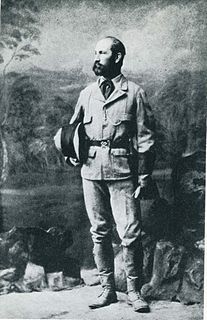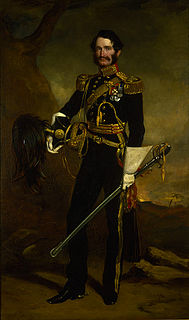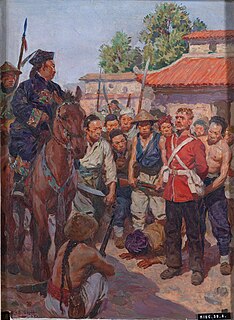 W
WLieutenant-Colonel Augustus Henry Archibald Anson, VC was a member of the Anson family and a recipient of the Victoria Cross, the highest and most prestigious award for gallantry in the face of the enemy that can be awarded to British and Commonwealth forces. He served as member of parliament for Lichfield from 1859 until 1868, and for Bewdley from 1869 to 1874.
 W
WGeneral Sir Robert Biddulph, was a senior British Army officer. He served as Quartermaster-General to the Forces in 1893, and was then Governor of Gibraltar until 1900.
 W
WField Marshal Sir Charles Henry Brownlow was a senior Indian Army officer. He served on the North West Frontier in the Hazara Campaign of 1853 and the campaign against the Mohmands in 1854. At the start of the Indian Mutiny, Brownlow was asked to raise an infantry regiment and formed the 8th Punjab Infantry which he commanded during that campaign, the Second Opium War, the Ambela Campaign and the Hazara Campaign of 1868. He commanded a column for the Lushai Expedition and then served as Assistant Military Secretary for India for ten years. After his retirement, as senior retired officer of the Indian Army, he was promoted to field marshal.
 W
WGeneral Sir Redvers Henry Buller, was a British Army officer and a recipient of the Victoria Cross, the highest award for gallantry in the face of the enemy that can be awarded to British and Commonwealth forces. He served as Commander-in-Chief of British Forces in South Africa during the early months of the Second Boer War and subsequently commanded the army in Natal until his return to England in November 1900.
 W
WNathaniel Godolphin Burslem VC, born in Limerick, Ireland; was by birth both Irish and by descent English recipient of the Victoria Cross, the highest and most prestigious award for gallantry in the face of the enemy that can be awarded to British and Commonwealth forces.
 W
WColonel John Worthy Chaplin, was a British Army officer and an English recipient of the Victoria Cross, the highest award for gallantry in the face of the enemy that can be awarded to British and Commonwealth forces.
 W
WMajor General Sir Henry Hugh Clifford was an English recipient of the Victoria Cross, the highest and most prestigious award for gallantry in the face of the enemy that can be awarded to British and Commonwealth forces.
 W
WMajor General Sir George Pomeroy Colley, was a British Army officer who became Governor and Commander-in-Chief of Natal and High Commissioner for South Eastern Africa. Colley was killed in action, at the Battle of Majuba Hill.
 W
WLieutenant General John Henry Ford Elkington was a British Army officer who became Lieutenant Governor of Guernsey.
 W
WColonel Henry Wemyss Feilden, CB was a British Army officer, Arctic explorer and naturalist.
 W
WGeneral The Hon. Sir St. George Gerald Foley was a British Army officer who became Lieutenant Governor of Guernsey.
 W
WMajor-General Charles George Gordon CB, also known as Chinese Gordon, Gordon Pasha, and Gordon of Khartoum, was a British Army officer and administrator. He saw action in the Crimean War as an officer in the British Army. However, he made his military reputation in China, where he was placed in command of the "Ever Victorious Army", a force of Chinese soldiers led by European officers. In the early 1860s, Gordon and his men were instrumental in putting down the Taiping Rebellion, regularly defeating much larger forces. For these accomplishments, he was given the nickname "Chinese Gordon" and honours from both the Emperor of China and the British.
 W
WLieutenant General Sir Gerald Graham, was a senior British Army commander in the late 19th century and an English recipient of the Victoria Cross, the highest award for gallantry in the face of the enemy that can be awarded to British and Commonwealth forces.
 W
WGeneral Sir James Hope Grant, GCB was a British Army officer. He served in the First Opium War, First Anglo-Sikh War, Indian Mutiny of 1857, and Second Opium War.
 W
WColonel Alfred Spencer Heathcote VC was an English recipient of the Victoria Cross.
 W
WSurgeon General Sir Anthony Dickson Home VC KCB was a Scottish recipient of the Victoria Cross, the highest and most prestigious award for gallantry in the face of the enemy that can be awarded to British and Commonwealth forces.
 W
WSir Henry Montague Hozier was a British Army officer who became secretary of Lloyd's of London.
 W
WGeneral Sir Thomas Kelly-Kenny, was a British Army general who served in the Second Boer War.
 W
WThomas Lane VC was an Irish recipient of the Victoria Cross, the highest award for gallantry in the face of the enemy that can be awarded to British and Commonwealth forces.
 W
WLieutenant Colonel Edmund Henry Lenon VC was an English recipient of the Victoria Cross, the highest and most prestigious award for gallantry in the face of the enemy that can be awarded to British and Commonwealth forces.
 W
WLieutenant-General Richard George Amherst Luard was a British Army officer who became General Officer Commanding the Militia of Canada.
 W
WJohn Leishman McDougall VC was a Scottish recipient of the Victoria Cross, the highest and most prestigious award for gallantry in the face of the enemy that can be awarded to British and Commonwealth forces.
 W
WWilliam McWheeney VC DCM, also known as Mawhinney, was born in Bangor, County Down. He was an Irish recipient of the Victoria Cross, the highest and most prestigious award for gallantry in the face of the enemy that can be awarded to British and Commonwealth forces. He was awarded the VC for his service during the Siege of Sevastopol (1854–1855).
 W
WField Marshal Sir John Michel was a British Army officer. He commanded the 6th Regiment of Foot during the Eighth Xhosa War in 1851 and served as Chief of Staff of the British Army's Turkish contingent during the Crimean War in 1854 before transferring to India where he commanded the Malwa Field Force which pursued Tatya Tope in the aftermath of the Indian Mutiny. He then commanded the 1st Division at the Battle of Taku Forts in August 1860 during the Second Opium War and took part in the burning of the Old Summer Palace at Peking in October 1860 as a reprisal for the torture and murder of British prisoners before being appointed Commander of British Troops in China and Hong Kong in 1861. He later commanded the forces in British North America playing a key role in the organization of the militia volunteers in resistance to the Fenian raids invasions in 1866. His last appointment was as Commander-in-Chief of Ireland in 1875.
 W
WPrivate John Moyse was a British soldier of the 3rd Regiment who according to popular legend was captured by Chinese soldiers during the Second Opium War and later was executed for refusing to prostrate himself before the Chinese general. This alleged act of defiance was later immortalised in The Private of the Buffs, a poem by Sir Francis Hastings Doyle.
 W
WJohn Perie VC was a Scottish recipient of the Victoria Cross, the highest and most prestigious award for gallantry in the face of the enemy that can be awarded to British and Commonwealth forces.
 W
WLieutenant-General Henry Andrew Sarel (1823–1887) was a British Army officer who became Lieutenant Governor of Guernsey.
 W
WGeneral Sir Charles William Dunbar Staveley was a British Army officer.
 W
WGeneral Sir Frederick Charles Arthur Stephenson, was a senior British Army officer who served as Major General commanding the Brigade of Guards and General Officer Commanding the Home District from 1876 to 1879.
 W
WGeneral Sir Charles Thomas van Straubenzee, was a British Army officer. He served as Commander of British Troops in China and Hong Kong, and Governor of Malta.
 W
WLieutenant-General Sir John Wellesley Thomas, was a distinguished British military officer who served in Afghanistan, Australia, and China. He was the commander of the British military and police forces that quelled the rebellion at the Eureka Stockade in Ballarat, Victoria, in 1854.
 W
WGeneral Sir Mark Walker was a British Army officer and an Irish recipient of the Victoria Cross, the highest award for gallantry in the face of the enemy that can be awarded to British and Commonwealth forces.
 W
WColonel Sir Henry Wilmot, 5th Baronet was an English recipient of the Victoria Cross, the highest and most prestigious award for gallantry in the face of the enemy that can be awarded to British and Commonwealth forces. He was also a Conservative Party politician.
 W
WField Marshal Garnet Joseph Wolseley, 1st Viscount Wolseley, was an Anglo-Irish officer in the British Army. He became one of the most influential and admired British generals after a series of successes in Canada, West Africa, and Egypt, followed by a central role in modernizing the British Army in promoting efficiency. He served in Burma, the Crimean War, the Indian Mutiny, China, Canada and widely throughout Africa—including his Ashanti campaign (1873–1874) and the Nile Expedition against Mahdist Sudan in 1884–85. Wolseley served as Commander-in-Chief of the Forces from 1895 to 1900. His reputation for efficiency led to the late 19th century English phrase "everything's all Sir Garnet", meaning, "All is in order."